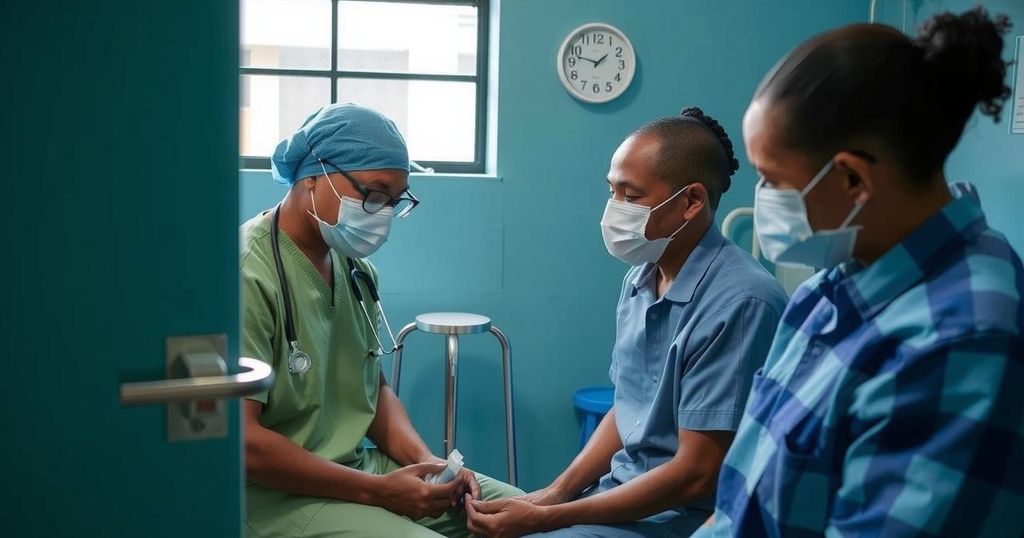Mpox Cases in DR Congo Show Signs of Decline Amid Vaccination Efforts

In the DRC, health officials report a decline in new mpox cases following the vaccination campaign that began last month. While the WHO acknowledges a plateauing in infections, experts warn against complacency. Approximately 900 deaths linked to the disease have been recorded this year, with a significant impact noted among children. Continued vaccination efforts are crucial as public health authorities reassess the outbreak’s status as a global emergency.
In the Democratic Republic of Congo (DR Congo), medics at the center of the ongoing mpox outbreak are reporting a significant decline in new infections since the initiation of vaccination efforts last month. According to the World Health Organization (WHO), case numbers appear to be “plateauing,” yet experts caution that it is premature to assess the full impact of the vaccinations. The mpox virus, previously known as monkeypox, has been linked to approximately 900 fatalities in DR Congo this year alone.
This developing situation comes as public health officials prepare to evaluate whether the mpox outbreak should remain classified as a global public health emergency. Health authorities across Africa have expressed concern, as infections continue to be reported across nineteen nations on the continent. Earlier this September, a BBC investigation at a clinic in Lwiro highlighted the overwhelming symptoms faced by the local healthcare system.
Nurse Emmanuel Fikiri emphasized the progress made, stating, “Right now, we can’t have more than 60 patients in the hospital. This is due to the fact that there has been an improvement, there has been vaccination against mpox and there has been support from several partners who have enabled us to take care of the patients.” The initial crisis saw hospitals inundated with patients, but recent observations indicate a notable improvement in the situation, largely attributed to effective vaccine outreach.
With over 265,000 doses delivered by international donors and a vaccination rollout that has reached over 50,000 individuals in high-risk areas, healthcare professionals express cautious optimism. Dr. Jean Kaseya of the Africa CDC highlighted a concerning trend—about 30% of those infected are children, who remain unvaccinated. However, a recent approval from the WHO for a children’s vaccine could significantly impact this demographic. Lwiro clinic’s nurse, Jackson Murhula, remarked on the decrease in new cases, adding, “Lately it’s started to slow down, because at the beginning we were receiving 10 or 15 new cases a day, but now we’re only receiving two or three cases a day.”
Amidst this backdrop, the plight of young patients continues to be a focal point, as demonstrated by the case of three-year-old Atukuzwe Banissa, who was hospitalized for mpox. There is a growing trend where patients are seeking medical attention promptly rather than consulting traditional healers. WHO’s incident manager for mpox, Dr. Samuel Boland, noted, “In the Democratic Republic of the Congo, we’ve actually seen, to some extent, a plateauing in the number of mpox cases, but collectively, it still is a very significantly affected country globally.”
Despite the stabilization of cases in DR Congo, more than 90% of global mpox fatalities this year have occurred within its borders. Health officials underline the importance of ongoing interventions to ensure that progress continues. Vaccination efforts are also expanding to neighboring nations like Rwanda, indicating a broader regional response. As the WHO deliberates on the global health alert status, the emphasis remains on continuous surveillance and prompt public health responses in the face of this infectious disease.
Mpox, formerly known as monkeypox, is a highly contagious viral disease that has become a significant public health concern, particularly in the Democratic Republic of Congo, where it is suspected to have caused numerous deaths. The DRC has faced an alarming outbreak of mpox, prompting international attention and assistance. Vaccination efforts have recently been introduced, aiming to control the spread and protect vulnerable populations, particularly as the disease has shown a disproportionate impact on children. As the situation evolves, health officials are monitoring infection rates to determine if the outbreak can be considered stabilized or if further action is necessary.
The recent observations from health care providers in DR Congo indicate a positive shift in the mpox outbreak situation, marked by a decrease in new infections following vaccination efforts. However, challenges remain, particularly concerning children’s vulnerability to the virus and the ongoing risk of transmission. While health experts express cautious optimism, a comprehensive approach involving continuous vaccinations and public health strategies will be crucial to combat the remnants of this outbreak effectively.
Original Source: www.bbc.com








